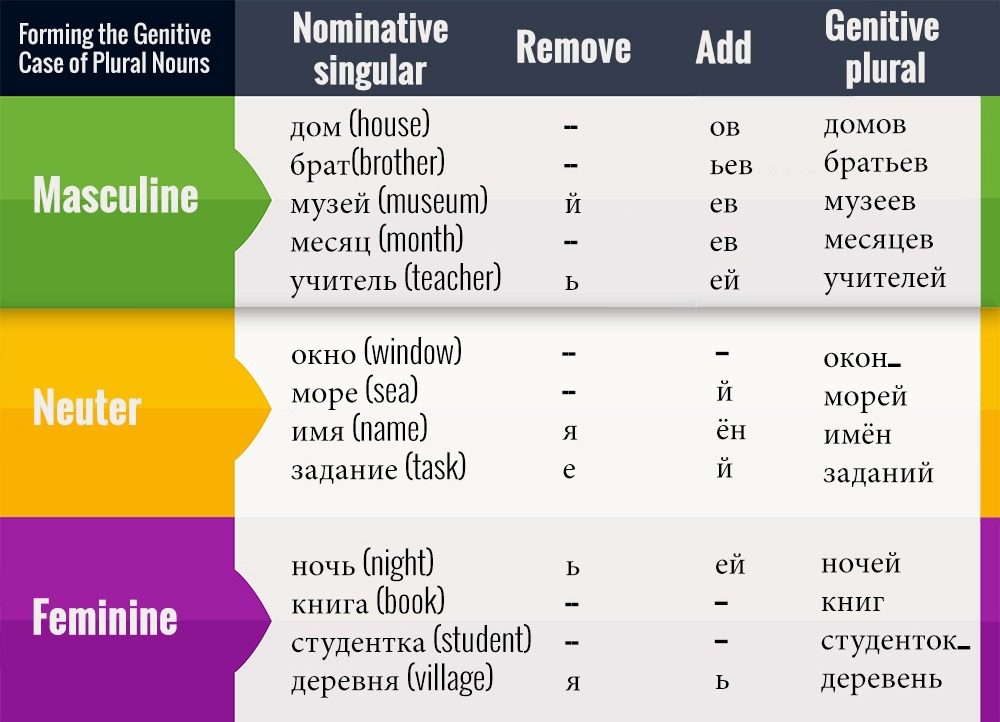
Declension Of Nouns In The Plural Russian Language
Singular genitive is used after cardinal numbers 2-5 (два/две, три, четыре, пять) and higher numbers which end in these words (22-25, 33-35, etc. ) plural genitive is used after cardinal numbers 6-20 and higher numbers ending with these (26-30, 106-120, etc. ) as well as anything ending in zero. Plural nominative де́ньги dénʹgi: genitive де́негъ déneg: dative деньга́мъ, де́ньгамъ * denʹgám, dénʹgam * accusative де́ньги dénʹgi: instrumental деньга́ми, де́ньгами * denʹgámi, dénʹgami * prepositional деньга́хъ, де́ньгахъ * denʹgáx, dénʹgax * *. мя́со • (mjáso) n inan (genitive мя́са, nominative plural *мяса́, genitive plural *мяс, related adjective мясно́й). Grammar for learnrussian rt. assumed you have the alphabet and vocab from corresponding lessons completed. for vocab see: memrise course 759447 learn-russian-vocab for all vocab genitive Сase мясо genitive plural nouns (14).
Wiktionary
Level 23 genitive Сase nouns (14) learn russian.
Translations 281 Examples And Declension
♦ as in english, certain nouns have no plural. this includes substances, feelings, etc. (things that cannot be counted): рыба (fish, the dish) пиво (beer) соль (salt) химия (chemistry) молоко (milk) мясо (meat) серебро (silver) любовь (love) сахар (sugar) нефть (oil) золото (gold). Declension and plural of fleisch. the declension of the noun fleisch is in singular genitive fleisch(e)s and in the plural nominative fleische. the noun fleisch is declined with the declension endings es/e. the voice of fleisch is neutral and the article "das". here you can not only inflect fleisch but also all german nouns. the noun is part of. Plural nominative мя́со mjáso * мяса́ * mjasá: genitive мя́са mjása * мя́съ * mjás: dative мя́су mjásu * мяса́мъ * mjasám: accusative мя́со mjáso * мяса́ * mjasá: instrumental мя́сомъ mjásom * мяса́ми * mjasámi: prepositional мя́сѣ mjásě * мяса́хъ * mjasáx.

From what i'm seeing, accusative in negative statements deals with a definite object while genitive in negative statements deals with an indefinite object is this correct? for example, Я не ем мяса (i do not eat meat in general) and Я не ем мясо (i am not eating the meat "as in this particular meat because it has fly on it. The declension of kotelett as a table with all forms in singular (singular) and plural (plural) and in all four cases nominative (1st case), genitive (2nd case), dative (3rd case) and accusative (4th case). especially for german learners the correct declension of the word kotelett is crucial. declension kotelett.
Genitive Plural Of Russian
дождь • (doždʹ) m inan (genitive дождя́, nominative plural дожди́, genitive plural дожде́й, related adjective дождево́й, diminutive до́ждик) (meteorology) rain. In plural башка may have 2 valid forms: башки́ and another one that changes letter in the root to бо́шки (with accent on the о́). in genitive those will respectively be башки́ (singular) and башо́к or бо́шек (plural). both variants are considered valid, even мясо genitive plural though i prefer the last one :).
The genitive (1) апельсин мясо тарелка серебро нож бутылка 8 give the nominative plural of the following words (if there is one): профессор подруга брат сын дочь мальчик цвет учитель секретарь золото серебро мужчина. Translation: meat, flesh. examples: Я не ем мя'са. i don't eat meat. Мя'со жёсткое. the meat is tough. Мя'со, пожалуйста. meat, please. Ни ры'ба ни мя'со. neither fish nor fowl. Russian: ·money Э́то сто́ит больши́х де́нег. ― Éto stóit bolʹšíx déneg. ― it costs a lot of money. ··inflection of де́ньга (dénʹga): genitive singular nominative/accusative plural. Translation: meat, flesh. examples: Я не ем мя'са. i don't eat meat. Мя'со жёсткое. the meat is tough. Мя'со, пожалуйста. meat.
дождь wiktionary.
The gender of an uncountable noun is irrelevant. uses of the genitive over the accusative can be seen across the мясо genitive plural genders. in this post, i inadvertently managed to provide examples of all three genders -мир (masculine), вода (feminine), and мясо (neuter). мясо. meat. руки. hands n inan (genitive посла́ния, nominative plural посла́ния, genitive plural посла́ний) message. гореть (perfective сгореть) to burn, to shine. гасить (perfective погасить) to put out, to estinguish, to turn off (lights).

The formation of the genitive plural is the same with any vowels preceding -я: ид е я: ид е й; ст а туя: ст а туй. 6. neuter nouns ending in -ье or -ьё. most nouns ending in -ье or -ьё take the ending -ий in мясо genitive plural the genitive plural: воскрес е нье (sunday): воскрес е ний; копь ё (spear, lance. Substantives in plural genitive. out of all russian cases, plural genitive is the most varied. two main ways to form genitive are: by removing the last vowel. if the stem ends in two consonants after vowel removal, a filler vowel is usually added between the consonants. this happens when the word ends in -а, -я or -о. Substantives in plural genitive. out of all russian cases, plural genitive is the most varied. two main ways to form genitive are: by removing the last vowel. if the stem ends in two consonants after vowel removal, a filler vowel is usually added between the consonants. this happens when the word ends in -а, -я or -о.
0 Response to "мясо Genitive Plural"
Posting Komentar